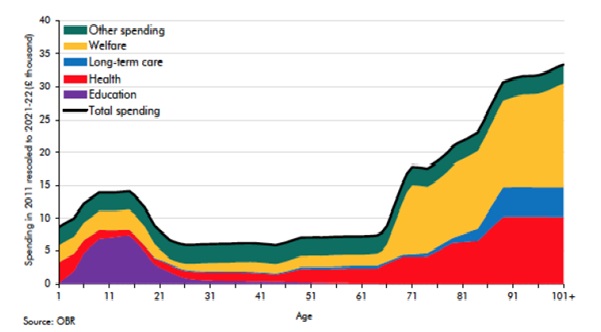Paul Carey-Kent, Policy Manager, CIPFA
The first annual Health and Social Care Conference to be organised collaboratively with HFMA, proved very successful with speakers delving into the challenges and issues faced by health and social care bodies.
Duncan Selbie, from Public Health England (PHE), gave an impassioned plea for preventative investment, the thinking behind which will be set out in a joint CIPFA/PHE publication on the evaluation of revenue investments due to be published early in the new year.
Richard Humphries, from The King’s Fund, delivered a magisterial overview of the challenges in health and social care, which included the dramatic and thought-provoking summary graph of spending by age.
Average public spending per person by age

Source: OBR Fiscal Risks Report, July 2017, http://cdn.budgetresponsibility.org.uk/July_2017_Fiscal_risks.pdf
Andrew Hood, from the Institute for Fiscal Studies, delivered a fact-packed explanation of what’s happening to the benefits system, outlining the Government’s three biggest policies and their planned long-run savings:
- The roll-out of universal credit (around £5bn per year).
- Cuts to child tax credit (around £5bn per year).
- Freezing most working-age benefit rates (over £3bn per year).
The problems caused by the changes now in train as Universal Credit is rolled out are increasingly coming to wider attention, though Andrew emphasised that the underlying motivation of the simplification* is sound – it is the contingent factors of reductions in total benefits, delays in initial payments, a switch from weekly to monthly basis and the cessation of payment direct to landlords which are causing the problems. Few were aware, however, as he pointed out, that the £12bn savings planned by 2021, because they are to be made by applying the reductions only to new claimants, will lead to much greater reductions in the years after that as all claimants eventually come into the new system. As the following graph shows, the changes yet to come (dark green) are far more significant than what has already been implemented, even though Unified Benefit was initiated as long ago as 2013. That lies behind the mounting calls for the roll-out to be halted.
Long run impact of tax and benefit reforms since May 2015

Source What's Happening to the Benefits System, Institute for Fiscal Studies
The conference also covered topics including integration, sustainability and transformation plans (STPs) and the promising new preventative approach of social prescribing.
* to replace six separate means-tested benefits and tax credits: income based Jobseeker's Allowance, Housing Benefit, Working Tax Credit, Child Tax Credit, income based Employment and Support Allowance and Income Support.
Discover more